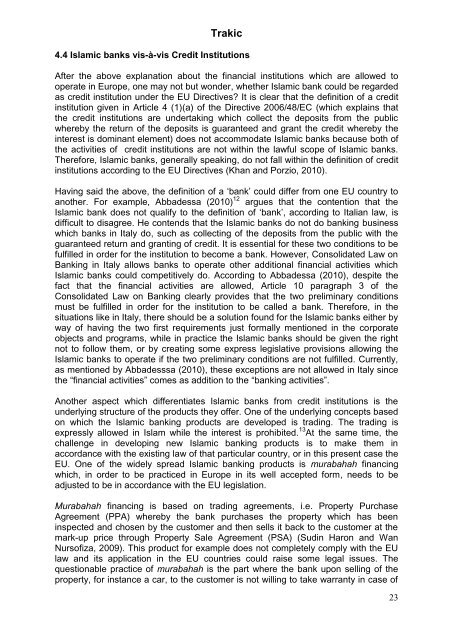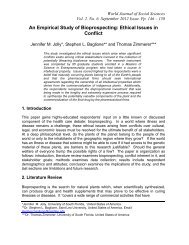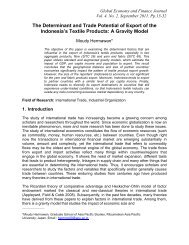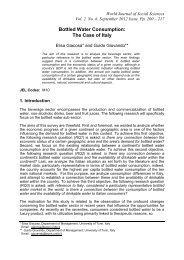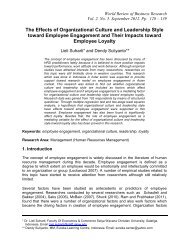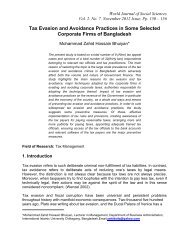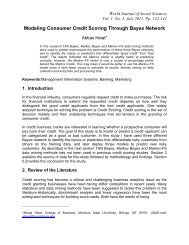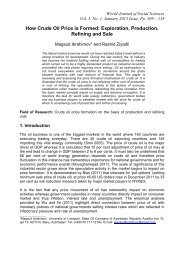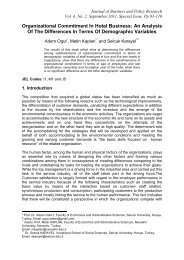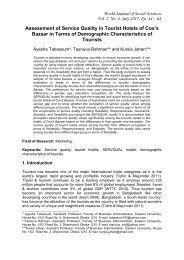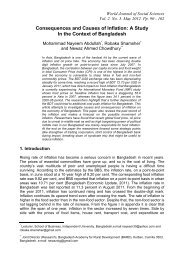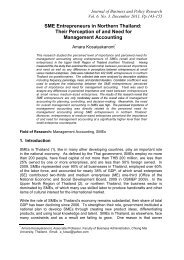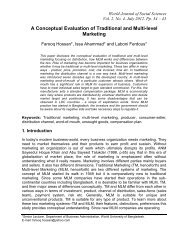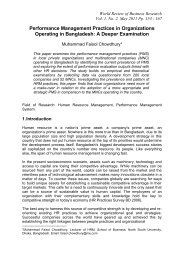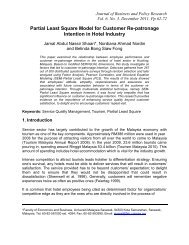Europe's Approach to Islamic Banking: A Way Forward - Wbiaus.org
Europe's Approach to Islamic Banking: A Way Forward - Wbiaus.org
Europe's Approach to Islamic Banking: A Way Forward - Wbiaus.org
You also want an ePaper? Increase the reach of your titles
YUMPU automatically turns print PDFs into web optimized ePapers that Google loves.
Trakic4.4 <strong>Islamic</strong> banks vis-à-vis Credit InstitutionsAfter the above explanation about the financial institutions which are allowed <strong>to</strong>operate in Europe, one may not but wonder, whether <strong>Islamic</strong> bank could be regardedas credit institution under the EU Directives? It is clear that the definition of a creditinstitution given in Article 4 (1)(a) of the Directive 2006/48/EC (which explains thatthe credit institutions are undertaking which collect the deposits from the publicwhereby the return of the deposits is guaranteed and grant the credit whereby theinterest is dominant element) does not accommodate <strong>Islamic</strong> banks because both ofthe activities of credit institutions are not within the lawful scope of <strong>Islamic</strong> banks.Therefore, <strong>Islamic</strong> banks, generally speaking, do not fall within the definition of creditinstitutions according <strong>to</strong> the EU Directives (Khan and Porzio, 2010).Having said the above, the definition of a ‘bank’ could differ from one EU country <strong>to</strong>another. For example, Abbadessa (2010) 12 argues that the contention that the<strong>Islamic</strong> bank does not qualify <strong>to</strong> the definition of ‘bank’, according <strong>to</strong> Italian law, isdifficult <strong>to</strong> disagree. He contends that the <strong>Islamic</strong> banks do not do banking businesswhich banks in Italy do, such as collecting of the deposits from the public with theguaranteed return and granting of credit. It is essential for these two conditions <strong>to</strong> befulfilled in order for the institution <strong>to</strong> become a bank. However, Consolidated Law on<strong>Banking</strong> in Italy allows banks <strong>to</strong> operate other additional financial activities which<strong>Islamic</strong> banks could competitively do. According <strong>to</strong> Abbadessa (2010), despite thefact that the financial activities are allowed, Article 10 paragraph 3 of theConsolidated Law on <strong>Banking</strong> clearly provides that the two preliminary conditionsmust be fulfilled in order for the institution <strong>to</strong> be called a bank. Therefore, in thesituations like in Italy, there should be a solution found for the <strong>Islamic</strong> banks either byway of having the two first requirements just formally mentioned in the corporateobjects and programs, while in practice the <strong>Islamic</strong> banks should be given the rightnot <strong>to</strong> follow them, or by creating some express legislative provisions allowing the<strong>Islamic</strong> banks <strong>to</strong> operate if the two preliminary conditions are not fulfilled. Currently,as mentioned by Abbadesssa (2010), these exceptions are not allowed in Italy sincethe “financial activities” comes as addition <strong>to</strong> the “banking activities”.Another aspect which differentiates <strong>Islamic</strong> banks from credit institutions is theunderlying structure of the products they offer. One of the underlying concepts basedon which the <strong>Islamic</strong> banking products are developed is trading. The trading isexpressly allowed in Islam while the interest is prohibited. 13 At the same time, thechallenge in developing new <strong>Islamic</strong> banking products is <strong>to</strong> make them inaccordance with the existing law of that particular country, or in this present case theEU. One of the widely spread <strong>Islamic</strong> banking products is murabahah financingwhich, in order <strong>to</strong> be practiced in Europe in its well accepted form, needs <strong>to</strong> beadjusted <strong>to</strong> be in accordance with the EU legislation.Murabahah financing is based on trading agreements, i.e. Property PurchaseAgreement (PPA) whereby the bank purchases the property which has beeninspected and chosen by the cus<strong>to</strong>mer and then sells it back <strong>to</strong> the cus<strong>to</strong>mer at themark-up price through Property Sale Agreement (PSA) (Sudin Haron and WanNursofiza, 2009). This product for example does not completely comply with the EUlaw and its application in the EU countries could raise some legal issues. Thequestionable practice of murabahah is the part where the bank upon selling of theproperty, for instance a car, <strong>to</strong> the cus<strong>to</strong>mer is not willing <strong>to</strong> take warranty in case of23


